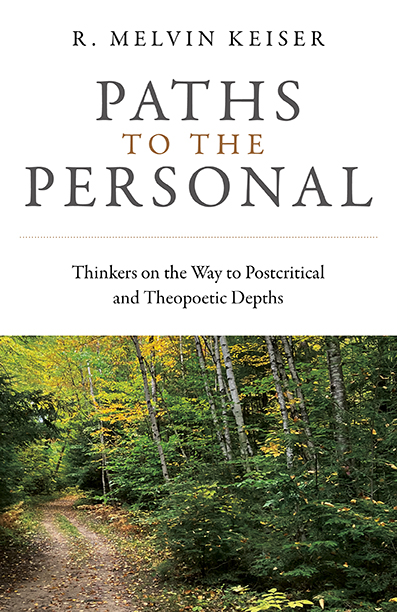Paths to the Personal
Explores the depths of the personal through postcritical and theopoetic lenses, and fleshes out the richness of insights and limits in Augustine’s — as well major 20th-century thinkers’ — understanding of our deepest self.

Explores the depths of the personal through postcritical and theopoetic lenses, and fleshes out the richness of insights and limits in Augustine’s — as well major 20th-century thinkers’ — understanding of our deepest self.
Explores the depths of the personal through postcritical and theopoetic lenses, and fleshes out the richness of insights and limits in Augustine’s — as well major 20th-century thinkers’ — understanding of our deepest self.
Quaker, Religious, Spirituality
Paths to the Personal: Thinkers on the Way to Postcritical and Theopoetic Depths seeks to define and explore the dimension of the personal underlying all knowing, doing, being, and religion. Using a lens combining Michael Polanyi’s postcritical and Stanley Hopper’s theopoetic thought, which carries the author into and beyond their explorative depths of the personal, Keiser asks to what degree the personal is present in the thinking of Augustine, Tillich, H.R. Niebuhr, Fritz Buri, Freud, Mircea Eliade, Merleau-Ponty, William Poteat, Hopper, and Polanyi. The immersive issues in these pages are: how we know; how words (symbols, metaphors, myths, and religious talk) work; contributions of philosophy to justice and peace-making; and the nature of religious thinking and being. While not focused on Quaker thought and spirituality, the author's Quaker perspective undergirds these inquiries.
Click on the circles below to see more reviews
In this age of electronic noise, political antagonism, and general discontent, where can one find guidance to coherent living that matters? Mel Keiser provides the reader with a menu of thinkers who provide such guidance from distinct but largely compatible perspectives. Michael Polanyi’s post-critical philosophy, with its emphasis on the tacit dimension, plays the leading role in Keiser’s constructive thought. But Keiser seasons his thought with such additional influences as Augustine’s reflections and confessions, Merleau-Ponty’s notion of figure and ground, H. Richard Niebuhr’s responsible self, Paul Tillich’s dimension of depth, the Quaker practice of silence, and Stanley Hopper’s substitution of imaginative theopoiesis for the overly rigid and objectivist categories of much theology. Paths to the Personal delivers to the spiritually hungry a delicious feast of peaceful promise. ~ Walter Gulick, Professor Emeritus of Philosophy, Humanities and Religious Studies, Montana State University Billings; Past President and Book Review Editor Emeritus of Polanyi Society, and author of many essays for its journal, Tradition and Discovery
Aptly titled, Paths to the Personal presents Keiser’s quest to understand what “personal,” at its most profound, means. Writing in multiple genres, such as academic essays, meditations, and letters to a friend, he engages the thought of numerous thinkers across the ages including St. Augustine, Mircea Eliade, Paul Tillich, and Ludwig Wittgenstein, as well as his Quaker religious tradition. At center stage, however, are Michael Polanyi, H. Richard Niebuhr, Maurice Merleau-Ponty, Stanley Hopper, and William Poteat. Drawing creatively from these thinkers, Keiser develops compelling insights into phenomenology, psychology, theology, and religious experience that are deeply personal but far from private. They reflect his personal commitments rooted in the tacit that invite dialogue with others in the quest to integrate our embodied, passionate knowing, feeling, and doing. ~ Paul Lewis, Professor of Religion and Director, Ethics, Leadership, and Service Minor, Columbus Roberts Department of Religion, Mercer University, Macon, Georgia
Between his post-critical theopoetics and his Quaker Silence, Mel Keiser unfolds a way at once imaginative in its honesty, rigorous in its contemplation, mysterious in its “leadings.” ~ Catherine Keller, George T. Cobb Professor of Constructive Theology, Drew University Theological School